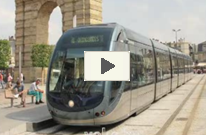Light rail will get you there on time (Seattle P-I)
One great benefit light rail will bring to all of us, for which detractors have no answer, is the certainty of travel time.
By Chi-Dooh Li
(Originally published in the Seattle Post-Intelligencer on October 24, 2007.)
I have driven on I-5 from North Seattle to Sea-Tac International Airport and back four times in the past two weeks, at different hours from early morning to mid-evening. Each time, there has been heavy congestion southbound from the Ship Canal Bridge to south of downtown, and northbound from Spokane Street to the University District.
According to the Sound Transit Web site, taking light rail in the future from the U District to Sea-Tac would cut my travel time in half. I think I will save even more time.
Light rail opponents question the actual time savings. They have to. If they can persuade you there won't be much time differential between a train versus the bus or your own car, they can drive home (pun intended) their favorite argument -- light rail is an expensive boondoggle.
Those who gnash their teeth at light rail think they have an answer to every rationale in support of the $10.8 billion sought by Sound Transit in Proposition 1 -- money to add 50 miles to the light rail system, extending north to Alderwood Mall, south to Tacoma and east to Redmond. They dispute projections on timesavings, cost and ridership.
But one great benefit light rail will bring to all of us, for which detractors have no answer, is the certainty of travel time. Trains will -- count on it -- get you to your destination in a reliably predictable amount of time.
The same can never be said for any form of transportation that uses rubber tires on asphalt roads. Cars, buses, shuttle buses, vans, taxis -- you name it -- there is no way time of arrival can be accurately predicted.
Buses, the adored form of public transit among the anti-rail crowd, cannot even give you a fixed departure time. How often do we rush to the bus stop before the scheduled time, only to wait and wait for a bus that has been delayed by congestion?
Traffic congestion not only requires more actual driving or riding time but forces us to leave much earlier than we might need to in order to have some assurance of getting to our destination on time.
When we must be punctual for work, a doctor's appointment, a job interview, a business meeting or a kid's soccer game, how much extra time do we build in so we are not late? Even then, no "cushion" will guard against the gridlock created by the occasional perfect storm of traffic congestion: the rush hour multiple car accident under the Convention Center or at Southcenter, or a visiting dignitary motorcade.
Take light rail, and buffer time will be a thing of the past.
We know about the negative costs of traffic congestion brought about by wasted fuel, exhaust pollution, lost productivity, wear and tear on vehicle engines.
How do you measure the value of the peace of mind from knowing you will get to your destination on time, every time?
One of my granddaughters just began first grade this year. Some day when she is living near the UW campus and is about to finish her graduate or professional studies, and needs to go for job interviews at Microsoft in Redmond, Weyerhaeuser in Federal Way or Boeing in Everett, what mode of transportation do you think will assure that she will be on time for her appointment?
Back in 1968 and 1970, using the same arguments they are proffering today, light rail opponents voted down two regionwide rail rapid transit systems for which the federal government was ready to pay 90 percent of the cost. In 1972 they gave us instead a bus-only transit system.
Have buses, expanded roads and highways, a new and much wider Interstate 90 bridge and corridor, and myriad other infrastructure capital expenditures succeeded in relieving congestion?
Congestion today in the Puget Sound region is worse than in the late 1960s and early 70s, by several orders of magnitude.
The vocal anti-rail crowd owes us all a public apology, because the biggest boondoggle over the past four decades is the many tens of billions we have poured into transportation solutions that have failed to handle the traffic growth in this region.
Yet opponents of light rail want us to continue believing that "bus rapid transit" is the answer to congestion. I bet they have some snake oil to sell us too.


